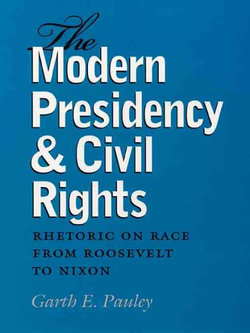Pauley's perspective is both historical and critical. It explores the pattern of presidential discourse on race in the modern era and considers the promise and limitations of presidential talk with regard to civil rights. The four significant episodes of American presidential speech Pauley examines are: Harry Truman's address of June 29, 1947, to the NAACP; Dwight Eisenhower's national address on September 24, 1957, following the integration crisis at Little Rock; John F. Kennedy's speech on June 11, 1963, labeling civil rights as primarily a moral issue; and Lyndon Johnson's voting rights message of March 15, 1965. Historical background is provided by a discussion of Roosevelt's racial stance.
Pauley's analysis is guided by several assumptions about the presidency, civil rights, and rhetoric, beginning with the assumption that presidential rhetoric matters. Pauley examines the role of rhetoric in leadership, policy making, and the political meanings and interpretations that form the political culture. Following in the tradition of his discipline, Pauley gives both close analysis of the speech text itself and consideration of the historical situation surrounding the speech.



Share This Book: